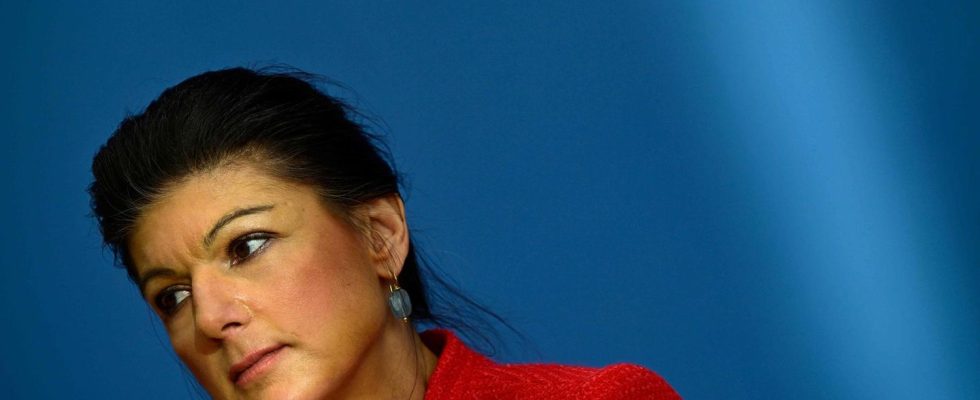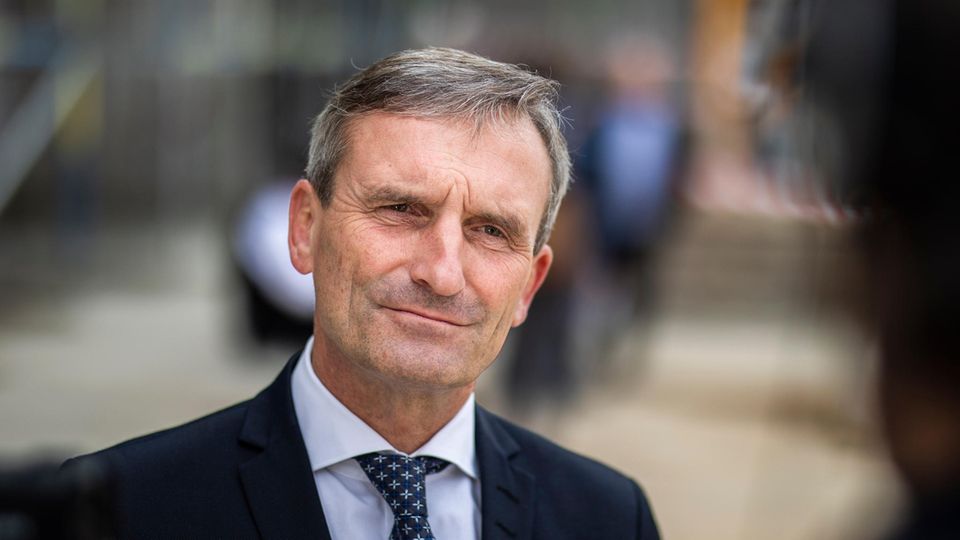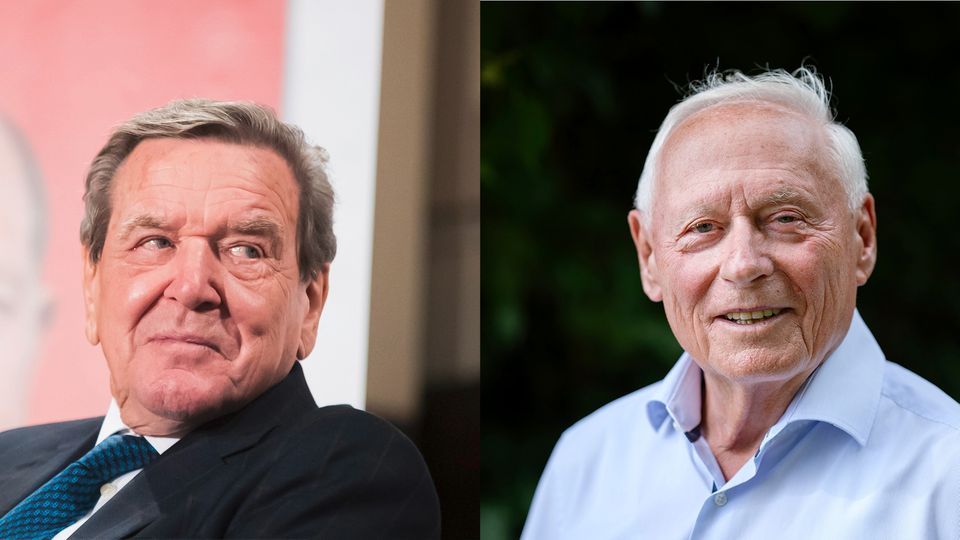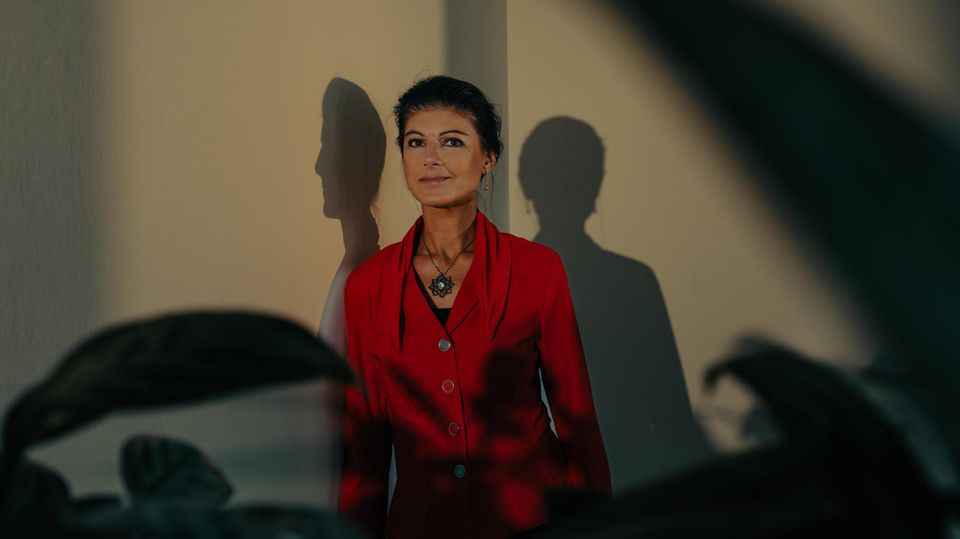Many believe that Sahra Wagenknecht wants to find voters with her new party, especially in the East. There is some evidence to suggest that it actually relies on the West – with a certain tune.
Sahra Wagenknecht looked extremely satisfied: “The alliance, which is not even a week old, is now also represented in the Rhineland-Palatinate state parliament,” the party founder announced in Mainz this week. Their new alliance “BSW” had just landed a coup: Andreas Hartenfels, a former Green party, switched to the Wagenknecht alliance. Hartenfels resigned from his party in protest in October 2022 because of the Greens’ Russia-Ukraine policy and has since sat in the Mainz state parliament as a non-attached party member. In Rhineland-Palatinate, of all places, the BSW now holds a parliamentary mandate, the first in a large state after the city states of Berlin and Hamburg.
This is not a coincidence: the “traffic light” enemy image is one of the major emotional points of attack that Sahra Wagenknecht and her new party are using to attract votes from the dissatisfied and disappointed – and in Mainz, Prime Minister Malu Dreyer (SPD) has been governing with the Greens since 2016 and FDP in a “traffic light” that was even the blueprint for the Berlin government.
The state capital Mainz itself has also been dominated by a traffic light constellation in the city council since 2009, and this has not been good for the political culture in Mainz recently: the Greens are now seen in Mainz, their former stronghold, as ideology-driven hardliners who, against all reason, have cars lock people out of the city, damage trade and restaurants and promote their clientel policy. Instead of a Green, the people of Mainz preferred to elect a non-party political newcomer with a doer image as mayor in February 2023, a real earthquake in the state capital, which had previously been governed by the SPD for 70 years.
The BSW and its structures in the west
Traffic light frustration, hatred of the Greens – the coup in Mainz shows how much Wagenknecht is also interested in the current political frustration in the western federal states. The Greens have a long history of government here, and this is where they trigger the most anger and resistance against “wokeness” and supposed paternalism. Wagenknecht recently brought the former SPD mayor of Düsseldorf, Thomas Geisel, to the BSW, and new structures are also being put in place at a rapid pace elsewhere: In Bavaria, the ex-leftist Klaus Ernst – once co-founder of the “Election Alternative for Work and Social Justice” WASG) – is busy building one Basis for the new alliance, surveys show that the BWS has a voter potential of around 14 percent.
The treasurer and financial puller for the new party is also an entrepreneur from Baden-Württemberg: The first association, “Bündnis Sahra Wagenknecht,” which was founded by millionaire Ralph Suikat, had its headquarters in Karlsruhe. So will the West, with its large, populous countries, become the party’s real bastion, not the East?
“Historically, we have always had a tendency towards radicalization in the southwest,” says political scientist Karl Rudolf Korte, in an interview with star. Right-wing extremist parties such as the Republicans or the NPD had their strongholds here, and during the Corona period they were the centers of the often esoteric anti-vaccination groups. Wagenknecht is also aiming at dissatisfaction and distance from the established system; Korte believes that the inaugural moment was “well chosen in this year of dissatisfaction”: “We have a breakdown in communication between the government and the governed,” he analyzes – many citizens no longer feel like they are involved in politics heard, no longer see their problems solved. The founding of BSW was also a “result of this conversation disorder.”
In “Operation West”, enemy images that are particularly trapped here in the West should also help: the traffic light government – and the Greens. The former left-wing icon Wagenknecht went to war against them before her new party even became apparent. Wagenknecht is now accusing the Greens of driving people onto the streets to protest with their “arrogance, incompetence and arrogance.” She castigates the Greens’ foreign policy as particularly “hypocritical”, accuses the Foreign Minister of “moral mendacity” when it comes to arms sales – and not by chance drops catchphrases like “Ramstein”.
Sahra Wagenknecht and the peace movement
Wagenknecht hits a nerve deep in the (south) west of the republic: “I come from the peace and environmental movement,” says ex-Green Hartenfels in an interview with star. The fact that he had to witness a Green foreign minister defending arms deliveries and sanctions on Russia at the Green Party’s federal party conference in October 2022 was “simply unbearable” for him. Baerbock wants to “destroy Russia,” says Hartenfels, in very Wagenknecht style. Instead of buying cheap gas from Putin, the traffic lights would rather ruin Germany, Wagenknecht also prompts, as if the war in Ukraine didn’t exist. Peace-loving ex-Green meets Putin understander. And they both get along great.
It is the sound of the old West German peace movement that Wagenknecht is trying to play on: “Creating peace without weapons”, the slogan of the 1980s from the large demonstrations against nuclear missiles and NATO’s double decision, when people demonstrated for disarmament in Ramstein, and at Easter the endless peace marches, he is now experiencing a distorted resurrection. To this day, the former Hessian left-wing member of the state parliament, Willi van Ooyen, organizes peace marches and Easter rallies in Frankfurt. Meanwhile, with a view to Ukraine, the motto here is also: “Put down your weapons!” There are also calls for a halt to the Bundeswehr equipment program and the Greens’ supposed “warmongering policy” – just like Wagenknecht.
Their “Sound of Peace” includes the demand that peace negotiations in the Ukraine war must “finally” be held; weapons do not solve the problem. The fact that it is Russia that shows no willingness to negotiate, that Russia invaded Ukraine and is waging a campaign of destruction against its neighboring country – all of this is studiously ignored. It is accepted that Ukraine, a democracy-oriented state, would be overrun. “Wagenknecht is closer to Moscow than to Washington,” says Korte: “She is very anti-imperialist – and what she offers is left-wing authoritarian.”
There is deep disappointment in the Ahr Valley
The party founder traveled from her home in Saarland, where the US airbase Ramstein is located just outside the gates – and where her husband Oskar Lafontaine achieved magical electoral successes for the Left for decades. The former “Napoleon of the Saar” enjoyed almost revered status in the small Saarland, and now the new BSW alliance is also believed to have voter potential well into the middle. And it is no coincidence that Alexander Ulrich, an ex-leftist from Kaiserslautern, is now supposed to set up the BSW in Rhineland-Palatinate: The Southern Palatinate is one of the most left-behind regions in Germany.
Surveys by the SWR confirmed that Dreyer’s traffic light government had reached a “historic low in approval”; 55 percent even said that they saw “reason for concern in the conditions in Rhineland-Palatinate.” This not only reflects the frustration over the handling of the flood disaster in the Ahr Valley, with the still slow reconstruction and the refusal of the state leadership to take responsibility for the mistakes made on the night of the flood. In the Ahr Valley, disappointment and anger are so deep that sympathy for the AfD has increased rapidly.
It is also the frustration over the poor refugee policy of the traffic lights in Berlin as well as in Mainz that is causing the communities to groan: For months, communities nationwide have been demanding remedial action when it comes to refugee accommodation. The reactions of Federal Interior Minister Nancy Faeser (SPD)? Poor. Wagenknecht serves this dissatisfaction when she calls for limiting migration and bringing “reason” back into politics.
Added to this is the popular aversion to colons and gender stars in large parts of the population, the railing against “cancel culture” – and the promotion of the narrative that there is now “a questionable way of dealing with protests”. It is immediately assumed that protests like those of the farmers are infiltrated by the right, but in reality “only very decent citizens are fighting back,” complains Wagenknecht. This reflects the feeling of many who, especially in the southwest, gave the lateral thinkers a strong following in the Corona pandemic, felt excluded as opponents of vaccination and saw themselves in a kind of new anti-establishment struggle.
Hartenfels – an opponent of vaccination during the Corona period – also speaks of “millions of people” who discriminated against the Greens during the Corona period. In the name of the BWS, he now wants to call for a study commission in the Mainz state parliament to “process” the Corona measures – that The fact that the AfD has been making the same demand for months doesn’t bother him. Hartenfels complains that in Germany today people are being “tested for their attitudes” and this is resulting in “an authoritarian style of government” – that also borders on AfD-speak. Hartenfels wants to differentiate himself sharply from them: “I’m glad that there is an alternative.”
“We can stop the AfD from gaining further strength,” asserts Alexander Ulrich confidently – we are targeting the potential of civil society who choose protest but do not want to end up with extremists. And so the new alliance is not only focusing on the European elections and the state elections in Rhineland-Palatinate in 2026, they also want to take part in the local elections on June 9th this year, at least in individual municipalities. Wagenknecht emphasized at the end that she received “a lot of feedback,” especially from rural regions, from those who felt let down by politics but did not want to vote for the AfD. This is certainly not just aimed at the East.




